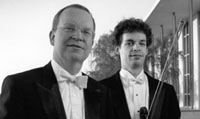
According to the National Symphony Orchestra's assistant principal violist, Bill Foster '66, the only thing better than being first viola yourself is seeing your son as first chair. And all Bill has to do to enjoy this distinct pleasure is to glance over at his stand partner.
"The chance that any one person is ever going to be a principal violist anywhere, period, is incredibly slim," remarks Dan Foster '91, still astonished at his own 1994 elevation to principal violist of the NSO. "Add to that the fact that I got the job here and it's, well, just bizarre."
Maybe. But not so bizarre for a child of Bill Foster and Nancy Kendall Foster '66. After all, besides having a professional musician for a father, Dan's maternal grandmother, Katherine Wolff Kendall '42, is more than proficient on the viola, and his paternal grandfather, John Kendall '39, introduced the Suzuki method of violin teaching into the United States.
Katherine and John's daughter Nancy seemed predestined to play the cello. "My mother was pregnant with me and riding on an elevated train in New York when she spotted a tiny cello in pawn shop window," says Nancy, recounting the tale her mother told her. "She got off the train at the next stop, walked back, and bought it. When I was about three I found it in a closet, dragged it out, and wanted to play it. I still love to play and am now in a regular quartet."
"In first grade I cut up in class so badly, the teacher decided to send me down to do music one day a week to get rid of me," Bill recalls of his own musical beginnings. His parents had already started him on piano when he was five, but he secretly envied his older sister, who played violin. "That day the music teacher asked me what I wanted to play, and I chose violin. Then when I came home from school, I announced to my parents: 'Who says I have to practice piano anymore?'"
Bill's first teacher was his aunt, then assistant principal second violinist in the Toledo Orchestra (and mother of Genette '65). Even though skipping practice was not an option, Bill recalls that his pre-Oberlin musical experience was thin.
"When I went to Oberlin, I thought I would do a double degree in math and viola. Oberlin was the obvious choice because I knew I loved music but also wanted strong academics. In the end I took a lot of math but dropped the double-degree idea pretty early on in my first year.

"When I chose music as a career, I just didn't know any better. But when we went out to visit Nancy's parents and played chamber music together, I think her parents were pretty worried. I really had a lot of catching up to do."
Oberlin did help turn Bill Foster into a musician of professional caliber, but not in the way he expected. For while his viola training proved disappointing, his chamber-music experience with fellow students was superb.
"I played in a quartet seriously for three years in a way that I had never known. I recently found a letter I wrote telling my parents about a big revelation I had that music was more than just playing notes. It's embarrassing to have come to that realization so late."
Playing in the quartet not only added to Bill's musical sophistication, the relationships fostered among members helped get him a job. After earning an M.A. from the Cleveland Institute of Music and playing one disappointing audition in Detroit, his old quartet partner, George Seamans '66, called to let him know that a couple of viola positions were opening up at the NSO.
"So in '68 I came to Washington--the first time I'd ever been in a place where you could hail a cab. There were two openings in the viola section and three people auditioning. Nowadays if we have one opening, at least 60 or 70 people show up. Back then, too, there was no Audition Committee like there is now, with a dozen members of the orchestra assisting the music director. That day there were just the music director, the personnel manager, and the principal flute player. As I remember it, the principal violist wasn't even at the audition.
"I knew that one of the players was coming from the Philadelphia Chamber Orchestra and thought I didn't have much chance there. Then I heard the other person warming up and thought he sounded great. So despite the odds, I didn't think I'd get the job. But I did, and I've been here ever since."
Bill, Nancy, and their first child, Ben '89, moved to D.C., where Dan was born, thus completing the family quartet. Both boys started out playing violin, but Ben developed a nerve problem that made playing painful. He studied economics and math at Oberlin, but being a Kendall-Foster, continued to practice more than a lot of musicians with professional hopes, until his health stopped him even from that.
A music career seemed equally unlikely for Dan. For while he studied and played in chamber groups throughout high school, he never considered his playing good enough to go professional. And practicing was low on his list.
"It never occurred to us that he would consider music as a career," says Bill. "But when Nancy overheard him tell a friend 'My parents don't think I should go into music,' we were appalled. I didn't want him thinking 10 years from now that he hadn't gone into music because his parents were against it. And while I felt he didn't practice seriously enough, I knew he played better than I had at his age, so who was I to judge what he could do?"
How could Dan's parents know he wanted to go into music if Dan didn't know himself. He had resisted following in the tracks of his dad--and his mom, and grandparents, and cousin, and brother.
"I was fairly dead-set against Oberlin all the way along," says Dan. But when he finally decided on music and on switching to viola, Oberlin was the only school he had applied to with a strong music program. "Both of those decisions were hard because it seemed, 'Here we go again, no mind of my own.' But I'm not sorry--not at all."
Once at Oberlin, Dan was overwhelmed by the sudden wealth of time he had to practice.
"Put it this way--if I had wanted to practice in high school, I wouldn't have been able to find the time. But in college you have fewer classes and the option of doing different things. Having the time to go into the practice room and really work seemed an incredible luxury to me."
Dan's viola teacher, Professor Jeffrey Irvine, also turned out to be just what he needed.
"In addition to addressing the technical issues, he gave me the confidence to realize I could get up on stage and project something."
Dan studied orchestral works and audition repertoire with Irvine's wife, Lynne Ramsey, associate principal viola of the Cleveland Orchestra, who stressed the importance of being prepared and consistent and set a high technical standard. The couple's dual influence extended even beyond graduation, when Dan went on to study at the Curtis Institute of Music with their teacher, Karen Tuttle.
At Oberlin he was lucky again with music theory.
"I took all my theory with Warren Darcy '68--a terrific teacher. He gave us a solid foundation, and his course on Wagner's Ring Cycle was definitely my academic high point at Oberlin."
At Oberlin Dan acquired confidence, technique, and theory, but chiefly he worked.
"The whole process of becoming a better musician is a series of 'aha!' experiences. It's not gradual, or steady, or step-wise. You work every day. Some days you bang your head against a wall. Then you have a revelation."
But Dan's parents--who knew he had switched to viola only in time to prepare a few pieces for his Oberlin audition--remained unconvinced.
"When Daniel told us he was expected to practice four hours a day as if he actually intended to, we were amused. When Jeff told us our son was so tremendously talented there was no limit to what he could do, we thought he was just being nice. It was only in the summer after his second year, when Dan called to tell us he was a finalist in the Primrose Competition, that doubt began to set in. Then he called us from California to tell us he'd won."
Bill can take more than parental pride in his son's success. He was Dan's teacher until Dan was 11. They understand each other perfectly.
"He knows better than to give me dirty looks," Dan quips, but the truth is, father and son get along too well to need any.
"It's professional," suggests Leonard Slatkin, the long-awaited new conductor of the NSO. "Every orchestra has a fair number of married couples or other close relationships. But on stage you put that sort of thing aside and do your job."
Ever good-natured, Bill has learned to deflect such inevitable questions as: "How does it feel to have your son telling you what to do?" with: "It's no different from the last 20 years."
Bill and Dan are still scratching their heads over the sheer improbability of sharing a stand at the NSO. Yet if the family continues producing superb musicians, it may soon be more surprising to find an American orchestra without at least one Foster or Kendall in its ranks.
"I have some cousins who make me sound like an amateur," Dan demurs modestly. "Mom's brother's kids are unbelievable players. The 17-year-old is a violinist who just played the last movement of the Tchaikovsky concerto with the National Symphony and won a big national competition in St. Louis last year. The 14-year-old is a cellist who studies with our principal cellist and is already learning the most challenging cello literature that there is. It seems like each step gets better. I don't know what's going to happen with Oliver." (Oliver, son of still a different Kendall, is 2.)
Last February Dan, Bill, and the 10 other NSO violas filed out of the wings and stood in an imposing semicircle to play a fanfare for violas written in honor of the section by the orchestra's second bassoonist, Truman Harris. A hush fell over the audience as Dan Kendall Foster raised his bow and struck a chord. The chord was echoed back, challenged, doubled, and magnified from every side. The sound of violas filling the hall was a fitting tribute indeed to the chosen instrument of two of Oberlin's best.
Elizabeth J. Sherman earned a Ph.D. in Egyptology from the University of Chicago in 1986. Since then Beth has lived in Washington, D.C., where she is a freelance writer, presently under contract to the World Bank.
Return to the OAM Fall-Winter 1996 Table of Contents